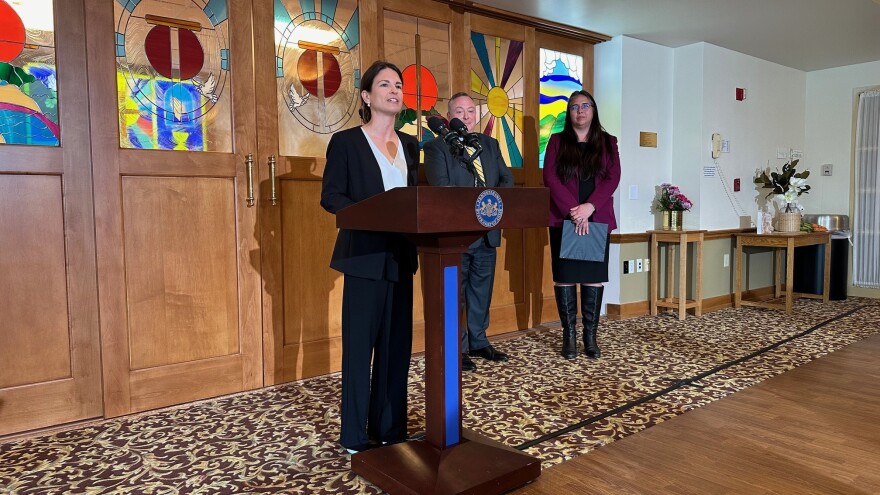BETHLEHEM, Pa. — Pennsylvania health officials came together at Bethlehem’s Kirkland Village to discuss recent upgrades to the long-term care facility and how interdepartmental teamwork can continue to improve other such agencies across the Commonwealth Thursday.
Kirkland Village Executive Director Staci Warsaw was joined by Secretary of Aging Jason Kavulich, Long-Term Care Transformation Office Director Megan Barbour, Department of Human Services Deputy Secretary for Long-Term Living Juliet Marsala, Pennsylvania Health Care Association Director of Quality and Clinical Affairs Chris Fisher, and LeadingAge PA Senior President and CEO Garry Pezzano to talk about the work accomplished at Kirkland thanks to the Long-Term Care Transformation Office, and how much of an impact the institution and its partners have made significant improvements to are for Pennsylvanians.
Warsaw began the engagement by speaking about Kirkland and its 249 independent living apartments, 33 personal care apartments, 48 skilled nursing beds, and their memory support area. Warsaw said the facility cares for approximately 20 to 25 short-term rehabilitation patients daily and participates as a preferred provider with the Lehigh Valley Health System Post Acute Care Collaborative.
“The Shapiro administration believes in this work, which is why Governor Shapiro has proposed the necessary funding in his 2024-2025 state budget to make this office permanent."Long-Term Care Transformation Office Director Megan Barbour,
Kirkland also features a health and wellness center, a walk-in medical clinic, a fitness personal training program, and numerous other accommodations for residents.
However, the highlight of Warsaw’s speech came in detailing how Kirkland was able to utilize grant money to improve services for those residents.
“But one of the big reasons you're all here today at Kirkland Village is because we were one of the fortunate recipients of a grant from the Long-Term Care Transformation Office, the grant we were awarded was in the infrastructure track,” Warsaw said.
“And we are using those funds to add a Wi-Fi access point in our personal care home and to purchase three iPhones that have a push-to-talk feature, kind of like a walkie-talkie. These infrastructure enhancements are going to help enable our team members to more easily communicate with one another when responding to resident call bells, or in the case of any emergencies, creating a safer environment for both our residents and our employees.”
Kavulich commended the cross-agency work which various government entities to “come together and work together and work with partners from the community, and work with partners like all of you to make sure that older Pennsylvanians who live in communities just like this, that have the resources that they need to make sure that they live and thrive in an environment that they choose that they have picked and that they really have the support and services that they deserve.”
The secretary of aging also praised the workers at Kirkland and similar facilities across the Commonwealth for dedicating their time and energy to ensuring residents receive the care they need.
Barbour noted how much work has been accomplished by her office via a grant from the Centers for Disease Control and Prevention, and how impactful a $14.2 million investment in funding for 126 long-term care facilities has improved infrastructure and the workforce.
Created in early 2023, the Long-Term Care Transformation Office works with assisted living, intermediate care, skilled nursing, personal care homes, and state veterans homes.
“The Shapiro administration believes in this work, which is why Governor Shapiro has proposed the necessary funding in his 2024-2025 state budget to make this office permanent,” Barbour said.
“With the proposed $10 million in state funding, we can continue to directly support our long-term care communities, and in turn the residents they care for, even after our federal funding expires this summer.”
Marcela detailed efforts from the DHS to provide even more support for long-term care facilities, including the implementation of a community resource coordinator program to help operators of care facilities housing those who utilize Supplemental Security Income.
“These coordinators will assist with addressing connections to places that can help with food insecurity, or identify additional staff training opportunities, support accessing additional government benefits, or clothing or personal items, and accessing activities or transportation as well as other services that will help residents continue to thrive,” Marcela said.
“DHS is adding additional licensing staff to better meet the needs of our homes and improve the expected timeliness of our license renewals and inspections. Alongside the Department of Health's Long-Term Care Transformation Office, these resources and changes will help us ensure that we are taking care of all Pennsylvanians.”
Speaking on the importance of funding and infrastructure to help staff at long-term agencies provide optimal care for residents, Fisher stated “any investment, as small as it may seem, is important to your day-to-day needs that you're doing in these facilities.”
“Our hope is that we continue to see the support that's demonstrated continuing in this year's budget where possible, and particularly investment in our impoverished elderly loved ones and neighbors who rely on Medicaid to pay for their care. We look forward to working with the state to build upon today's exemplary funding support, and the months and years to come,” Fisher said.
Pezzano applauded Kirkland for providing personalized clinical care with an in-house staff that does not require any temporary staffing assistance. According to Pezzano, attracting and maintaining a talented staff goes a long way toward offering the best possible care for residents.
Expanding on that, the director of quality and clinical affairs noted the importance of cross-agency work, and pursuing both incremental adjustments and exponential changes to the world of long-term care in Pennsylvania so that proper care can be administered.
“Without personal care, without assisted living, many of those residents would be in skilled nursing facilities. That is appropriate care, but it's not appropriate care for everyone. And that's what we want for older Pennsylvanians: We want choices. That's how we're going to make the difference.”
On Tuesday, February 6, 2024, Shapiro delivered his 2024-2025 budget address, which included $150 million earmarked to protect older Pennsylvanians. The complete budget currently stands at $48.3 billion, an 8.4% increase over the enacted 2023-24 budget.
According to the PHCA, on average, 70% of people currently over 65 will require long-term care in their lives, with an average care time of three years.
“Most individuals and families cannot simply cover these costs and services with their income and assets,” the PHCA website states, adding annual spending on long-term care in the United States has reached nearly $275 billion, with a payment breakdown of 47% Medicaid, 23% Medicare, 23% by families’ out-of-pocket expenses, less than 4% by veteran and state programs and less than 3% by private long-term care insurance.


